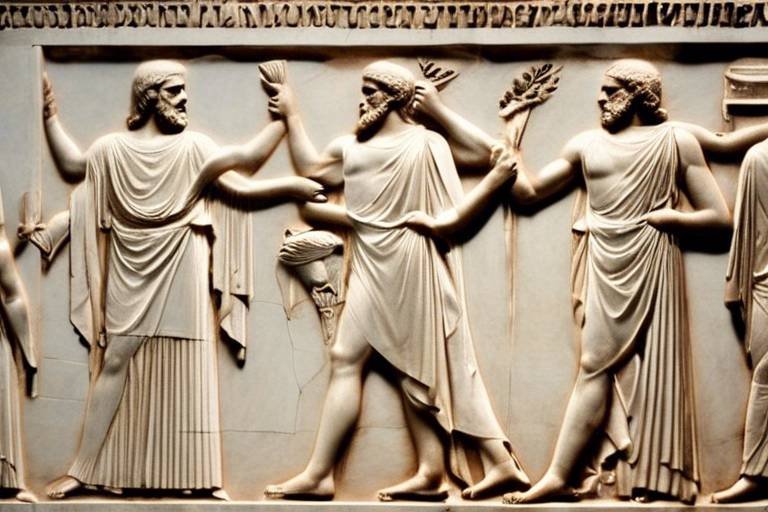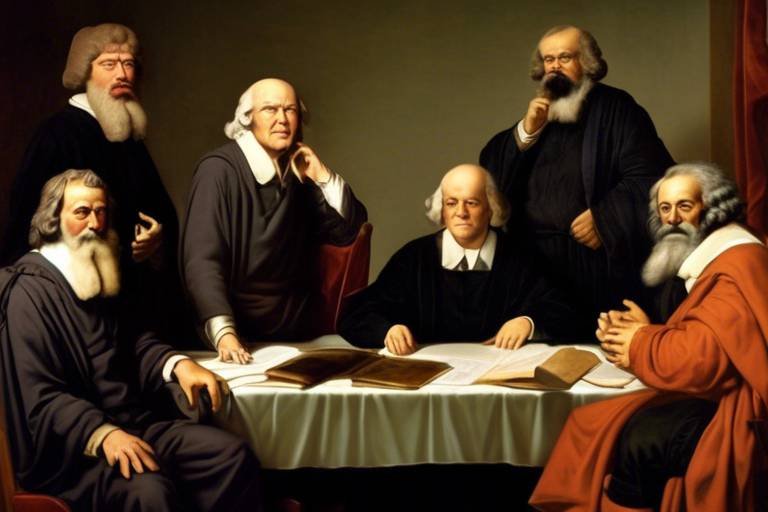Libertarianism vs. Authoritarianism - A Philosophical Analysis
When we dive into the vast ocean of political philosophies, two prominent islands stand out: libertarianism and authoritarianism. These two ideologies represent opposing views on governance, individual rights, and the role of the state. While libertarianism champions the cause of personal freedom and minimal government intervention, authoritarianism enforces strict control and prioritizes the needs of the state above individual liberties. In this article, we will explore these contrasting philosophies, their core principles, and the implications they hold for society.
At its core, libertarianism is a political philosophy that places a premium on individual liberty. It argues that individuals should have the freedom to make choices about their own lives, free from coercion and interference from the government. This ideology promotes free markets, personal autonomy, and voluntary cooperation among individuals. Imagine a bustling marketplace where every person is free to trade and engage in commerce without excessive regulations or government oversight. This is the essence of libertarianism.
The philosophy is grounded in several key principles:
- Individual Liberty: The belief that each person has the right to live their life as they see fit.
- Free Markets: The idea that economic transactions should be voluntary and free from government control.
- Minimal Government: The advocacy for a government that exists primarily to protect individual rights rather than to control or direct the lives of its citizens.
On the flip side, authoritarianism is characterized by a concentration of power in the hands of a ruling elite or a single leader. In this system, the state often exerts significant control over many aspects of life, including politics, economics, and even personal beliefs. Think of a strict school principal who enforces rules with an iron fist, leaving little room for student input or freedom. This metaphor captures the essence of authoritarian governance.
Authoritarian regimes are built on a foundation of beliefs that justify limiting personal freedoms. Some of these core principles include:
- Centralized Control: The belief that a strong central authority is necessary to maintain order and stability.
- Collective Good: The idea that individual rights can be sacrificed for the perceived greater good of society.
- Suppression of Dissent: The tendency to quash opposition and dissenting voices to maintain control.
Throughout history, we have witnessed the rise and fall of numerous authoritarian regimes. From the totalitarian rule of Stalin in the Soviet Union to the oppressive governance of North Korea, these regimes often leave a lasting impact on their societies. The consequences of centralized power can be dire, leading to human rights abuses, lack of political freedoms, and economic stagnation. The historical context of authoritarianism serves as a cautionary tale for those who value individual rights and freedoms.
In today's world, we can observe several countries that exhibit authoritarian tendencies. Nations like Belarus and Venezuela showcase how authoritarian governments can undermine civil liberties and suppress political dissent. Citizens in these countries often find themselves grappling with restrictions on free speech, limited access to information, and a lack of political representation. The impact on society is profound, as fear and repression stifle civic engagement and innovation.
Returning to libertarianism, its essential tenets are crucial for understanding its appeal. Libertarians advocate for:
- Personal Autonomy: The belief that individuals should have the freedom to make their own choices.
- Voluntary Cooperation: The idea that people can work together without coercion.
- Non-Aggression Principle: The ethical stance that aggression against others is inherently wrong.
When we juxtapose libertarianism and authoritarianism, we see stark differences in governance structures. Libertarian systems encourage citizen participation, accountability, and uphold the rule of law. In contrast, authoritarian regimes often prioritize obedience and control, leaving little room for public input or dissent. This difference shapes the way societies function and the freedoms individuals enjoy.
Examining the impact on personal freedoms reveals a significant trade-off between security and liberty in both frameworks. Libertarianism promotes a high degree of personal freedom, allowing individuals to pursue their own paths. On the other hand, authoritarianism often sacrifices individual rights for the sake of collective security, leading to a society where fear can overshadow freedom.
Finally, the broader societal consequences of libertarianism and authoritarianism are worth exploring. Libertarian societies tend to foster economic prosperity, social justice, and civic engagement, while authoritarian regimes often grapple with stagnation, inequality, and social unrest. The choice between these two ideologies is not merely academic; it has real-world implications for the quality of life and the future of societies.
1. What is the main difference between libertarianism and authoritarianism?
Libertarianism emphasizes individual freedoms and minimal government, while authoritarianism prioritizes state control and authority over personal liberties.
2. Can authoritarianism ever be justified?
Some argue that authoritarianism can provide stability and order, especially in times of crisis, but it often comes at the cost of individual rights and freedoms.
3. Are there any countries that successfully implement libertarian principles?
While no country is purely libertarian, some nations, like Switzerland, exhibit traits of libertarian governance, particularly in their economic policies and individual freedoms.
4. How do these philosophies affect daily life?
In libertarian societies, individuals enjoy greater personal freedoms and choices, while in authoritarian regimes, people often face restrictions that limit their rights and freedoms.

Defining Libertarianism
Libertarianism is a political philosophy that champions individual liberty as its highest ideal. The core belief is that every person should have the freedom to make choices about their own life, as long as those choices do not infringe upon the rights of others. This philosophy is grounded in the idea of personal autonomy and the conviction that individuals are best suited to determine their own needs and desires. Imagine a world where your choices are respected, where you can pursue your dreams without unnecessary interference—this is the essence of libertarianism.
At the heart of libertarianism lies the principle of minimal government intervention. Libertarians argue that the government should exist primarily to protect individual rights, maintain order, and provide for national defense. Beyond these functions, they believe that government involvement in personal and economic matters should be limited. This perspective fosters an environment where free markets can thrive, allowing individuals to engage in voluntary exchanges that benefit all parties involved. Think of it as a marketplace of ideas where every voice matters, and innovation flourishes without bureaucratic constraints.
Libertarianism can be broken down into several core principles, which include:
- Non-Aggression Principle: This foundational belief states that aggression against others is inherently wrong, and individuals should resolve disputes peacefully.
- Voluntary Cooperation: Libertarians advocate for interactions based on mutual consent, emphasizing that relationships—be they personal or economic—should be entered into voluntarily.
- Self-Ownership: The idea that individuals own themselves and have the right to control their own bodies and lives is central to libertarian thought.
Libertarianism also extends into various aspects of society, including social issues, where it promotes personal freedoms such as freedom of speech, freedom of association, and privacy rights. This philosophy asserts that individuals should be free to express their beliefs and live their lives as they see fit, without government interference. The belief is that a society that values diversity of thought and personal choice is one that is more likely to prosper and innovate.
In summary, libertarianism is not just a political stance; it is a way of viewing the world that prioritizes freedom and responsibility. By advocating for less government and more personal autonomy, libertarians believe they are paving the way for a society that truly respects individual rights and fosters an environment where everyone can thrive. As we delve deeper into the contrasts between libertarianism and authoritarianism, it becomes clear how these philosophical differences shape our understanding of freedom and governance.

Understanding Authoritarianism
Authoritarianism is a governance model that places a premium on the power of the state, often at the expense of individual freedoms. In this system, the government exerts significant control over many aspects of life, including political, social, and economic spheres. Unlike libertarianism, which champions personal liberty and minimal interference from authorities, authoritarianism thrives on the notion that a strong central authority is necessary to maintain order and stability. This often leads to a society where dissent is discouraged, and the rights of individuals are subordinated to the needs of the state.
At the heart of authoritarianism lies a belief in the necessity of control. Proponents argue that without a guiding hand, society could descend into chaos. They often justify their stance by citing historical examples where a lack of authority led to disorder and violence. While this rationale may resonate with some, it raises critical questions about the balance between security and freedom. Can we truly achieve a harmonious society if individual rights are consistently overlooked?
The characteristics of authoritarian regimes can vary widely, but they typically share several common traits:
- Centralized Power: Authority is concentrated in a single leader or a small group, limiting the role of democratic institutions.
- Limited Political Pluralism: Opposition parties and dissenting voices are often suppressed to maintain control.
- State Propaganda: The government controls media narratives to shape public perception and suppress criticism.
- Restricted Civil Liberties: Freedoms such as speech, assembly, and press are curtailed to prevent challenges to authority.
The historical context of authoritarianism reveals a complex tapestry of regimes that have risen and fallen over the centuries. From the totalitarian states of the 20th century, like Nazi Germany and Stalinist Russia, to modern examples like North Korea and Venezuela, the consequences of authoritarian governance can be dire. These regimes often prioritize state objectives over individual welfare, leading to widespread human rights abuses, economic mismanagement, and social unrest.
In contemporary society, authoritarianism manifests in various forms, with some governments adopting a more subtle approach to control. For instance, while some nations may not overtly suppress dissent, they employ tactics such as surveillance and censorship to stifle opposition. The digital age has introduced new challenges, as authoritarian regimes leverage technology to monitor citizens and manipulate information. Understanding these dynamics is crucial for recognizing the threats posed by authoritarianism in our increasingly interconnected world.
The implications of authoritarian governance extend beyond the political realm; they seep into the fabric of society. When individuals are stripped of their freedoms, it can lead to a culture of fear and compliance, stifling creativity and innovation. In contrast, societies that embrace personal autonomy tend to flourish, fostering environments where diverse ideas can thrive. As we navigate the complexities of governance, it is essential to critically examine the trade-offs between security and freedom, and to advocate for systems that prioritize individual rights while ensuring collective safety.

Core Principles of Authoritarianism
Authoritarianism, at its core, is a political philosophy that places the needs and goals of the state above the rights and freedoms of individuals. This ideology operates on several foundational principles that justify its existence and governance style. One of the most significant aspects is the belief in a strong, centralized authority capable of maintaining order and stability. This often leads to a reduction in personal freedoms, as the state imposes restrictions on various aspects of life, including speech, assembly, and even personal relationships.
Another core principle of authoritarianism is the notion of collective security. Proponents argue that individual liberties must sometimes be sacrificed for the greater good of society. This can manifest in various ways, such as increased surveillance, censorship of dissenting opinions, and strict law enforcement measures. The rationale is simple: a secure state is a prosperous state, and any threat to that security—be it external or internal—must be quashed swiftly.
Moreover, authoritarian regimes often rely on propaganda and control of information to maintain their grip on power. By manipulating the narrative and restricting access to diverse viewpoints, these governments can shape public perception and suppress opposition. This control not only ensures that the ruling authority remains unchallenged but also fosters a culture of fear and compliance among the populace.
To further illustrate the core principles of authoritarianism, consider the following table that summarizes the key characteristics:
| Principle | Description |
|---|---|
| Centralized Authority | Power is concentrated in a single entity or leader, limiting checks and balances. |
| Suppression of Freedoms | Individual rights are often curtailed in favor of state control and security. |
| Propaganda | Information is manipulated to maintain the regime's narrative and suppress dissent. |
| Collective Security | The belief that personal liberties can be sacrificed for the safety and stability of the state. |
In summary, the core principles of authoritarianism revolve around the supremacy of the state, the curtailment of individual freedoms, and the use of propaganda to maintain power. While these principles may promise order and stability, they often come at a significant cost to personal autonomy and democratic values. Understanding these foundational beliefs is crucial for recognizing the implications of living under such a regime and the potential consequences for society as a whole.
- What is authoritarianism? Authoritarianism is a political system where a single authority or government maintains strict control over many aspects of life, often at the expense of individual freedoms.
- How does authoritarianism impact personal freedoms? Authoritarian regimes typically suppress personal freedoms to maintain order and security, which can lead to censorship, surveillance, and limited rights.
- What are the advantages of authoritarianism? Supporters argue that authoritarianism can lead to stability and security, especially in times of crisis. However, these advantages often come with significant drawbacks.
- Can authoritarianism coexist with democracy? While some argue that authoritarian measures can be temporarily justified in democratic contexts, true authoritarianism fundamentally opposes democratic principles.

Historical Context of Authoritarianism
To truly grasp the essence of authoritarianism, we must journey back through history, examining its roots and evolution. Authoritarian regimes have emerged in various forms across different cultures and epochs, often as a response to crises or perceived threats. These systems prioritize state control, often at the expense of individual freedoms, and their historical context reveals much about their nature and implications.
One of the earliest examples of authoritarian governance can be traced back to ancient civilizations, such as the Roman Empire. The emperors wielded absolute power, often justified by the need for stability and order in a vast and diverse empire. This model of governance laid the groundwork for future authoritarian regimes, where the concentration of power in the hands of a single ruler or a small elite became a recurring theme.
Fast forward to the 20th century, and we see authoritarianism manifesting in various forms, particularly during times of political upheaval. The rise of totalitarian regimes, such as those led by Adolf Hitler in Germany and Joseph Stalin in the Soviet Union, serves as a stark reminder of the potential consequences of unchecked state power. These regimes employed propaganda, censorship, and state violence to suppress dissent and maintain control, often justifying their actions as necessary for the greater good.
In examining the historical context of authoritarianism, it's essential to consider the socio-economic factors that contribute to its rise. For instance, during periods of economic instability, such as the Great Depression, many nations turned to authoritarian leaders who promised quick fixes and strong governance. This phenomenon illustrates the delicate balance between security and liberty, as people often prioritize stability over personal freedoms in times of crisis.
The Cold War era further solidified authoritarianism in various parts of the world, particularly in Latin America, Eastern Europe, and Asia. Governments often justified their repressive measures as necessary to combat the spread of communism or maintain national security. The legacy of these authoritarian regimes continues to shape political landscapes today, as many countries grapple with the aftermath of decades of repression.
In contemporary society, authoritarianism has not vanished; rather, it has adapted. Modern authoritarian regimes often employ sophisticated technologies for surveillance and control, making it easier to stifle dissent while presenting an image of legitimacy. The rise of populist leaders in various democracies also reflects a shift towards authoritarian tendencies, where charismatic figures exploit public discontent to consolidate power.
In summary, the historical context of authoritarianism reveals a complex interplay of power, control, and societal response. From ancient empires to modern states, the patterns of authoritarian governance underscore the persistent struggle between the need for order and the desire for individual freedoms. Understanding this context is crucial for recognizing the signs of authoritarianism in today's world and advocating for the preservation of democratic values.
- What is the main difference between authoritarianism and libertarianism?
Authoritarianism prioritizes state control and authority, often limiting individual freedoms, while libertarianism emphasizes personal liberty and minimal government intervention. - Can authoritarianism ever be justified?
Some argue that in times of crisis, such as economic instability or national emergencies, authoritarian measures may be justified to maintain order and security. - What are some examples of authoritarian regimes today?
Countries like North Korea, Belarus, and Venezuela are often cited as contemporary examples of authoritarian governance. - How does authoritarianism affect civil liberties?
Authoritarian regimes typically restrict civil liberties, including freedom of speech, assembly, and the press, to maintain control and suppress dissent.

Contemporary Examples of Authoritarianism
In today's world, authoritarianism manifests in various forms across different regions, often cloaked in the guise of national security, stability, or even social order. One of the most striking examples is North Korea, a nation ruled by a dynastic regime that exercises extreme control over its citizens. The government maintains a tight grip on information, suppressing any dissent and promoting a cult of personality around its leader, Kim Jong-un. This regime illustrates how authoritarianism can create a society where individual freedom is virtually nonexistent, and the state dictates every aspect of life, from what people can read to how they can express their thoughts.
Another significant contemporary example is China, where the Communist Party has implemented a sophisticated system of surveillance and censorship. The government's extensive monitoring of social media and public discourse aims to prevent any form of dissent. The recent crackdown on pro-democracy movements in Hong Kong further exemplifies how authoritarianism can evolve and adapt to maintain control, often at the expense of personal liberties. The state justifies these measures by claiming they are necessary for maintaining social harmony and economic progress.
Moving to Eastern Europe, Russia under Vladimir Putin showcases another variant of authoritarian governance. The government employs a combination of propaganda, legal manipulation, and outright intimidation to suppress opposition. The imprisonment of political dissidents and the curtailing of press freedoms illustrate how authoritarian regimes often utilize fear to maintain power. The narrative presented to the public often revolves around the idea of restoring national pride and security, which resonates with many citizens, even as it erodes their freedoms.
In the Middle East, countries like Turkey and Iran also exhibit authoritarian characteristics. In Turkey, President Recep Tayyip Erdoğan has consolidated power, especially following the failed coup in 2016. The government has cracked down on journalists, academics, and political rivals, framing these actions as necessary for national security. Similarly, Iran's theocratic regime enforces strict social controls and punishes dissent harshly, often invoking religious justification for its policies.
To better understand the implications of these contemporary authoritarian regimes, consider the following table that outlines key characteristics and examples:
| Country | Type of Authoritarianism | Key Characteristics |
|---|---|---|
| North Korea | Dictatorship | Extreme state control, cult of personality, suppression of dissent |
| China | Single-party state | Surveillance, censorship, suppression of pro-democracy movements |
| Russia | Hybrid regime | Media control, political repression, propaganda |
| Turkey | Electoral authoritarianism | Consolidation of power, crackdown on opposition, national security rhetoric |
| Iran | Theocratic regime | Religious justification for control, strict social policies, punishment of dissent |
These examples highlight the diverse ways in which authoritarianism can manifest in modern governance. Each regime uses different tactics to suppress individual freedoms, often claiming that such measures are necessary for the greater good. However, the reality is that these actions frequently lead to significant human rights violations and a general atmosphere of fear and repression.
- What is authoritarianism? - Authoritarianism is a political system characterized by the concentration of power in a leader or an elite not constitutionally responsible to the body of the people. It often involves limited political freedoms and civil liberties.
- How does authoritarianism differ from totalitarianism? - While both systems limit freedoms, totalitarianism seeks to control every aspect of public and private life, whereas authoritarianism may allow some social freedoms but retains strict control over political power.
- Can authoritarian regimes be stable? - Yes, authoritarian regimes can maintain stability for periods, often by suppressing dissent and utilizing state propaganda. However, this stability can be fragile and may lead to unrest if citizens become disillusioned.

Core Principles of Libertarianism
At its heart, libertarianism is a philosophy that champions the idea of individual freedom and autonomy. It posits that every person should have the right to make choices about their own life, as long as those choices do not infringe upon the rights of others. This foundational belief leads to several core principles that define the libertarian worldview.
One of the cornerstones of libertarianism is the concept of the non-aggression principle (NAP). This principle asserts that aggression, defined as the initiation of force against others, is inherently wrong. Libertarians argue that a society built on voluntary interactions and mutual consent is not only ethical but also leads to better outcomes for everyone involved. Imagine a world where people engage in trade and cooperation without the looming threat of coercion—this is the ideal that libertarians strive for.
Another essential tenet is the belief in free markets. Libertarians maintain that economic freedom is crucial for prosperity. They argue that when individuals are allowed to pursue their interests without government interference, innovation flourishes, businesses thrive, and overall wealth increases. To illustrate, consider how the tech industry has exploded in recent years—much of this growth can be attributed to an environment that encourages competition and creativity. In a libertarian society, such opportunities would be abundant, as the market would dictate the terms of engagement rather than bureaucratic regulations.
Moreover, libertarianism advocates for minimal government intervention in both personal and economic affairs. This does not mean an absence of governance; rather, it emphasizes a government that exists primarily to protect individual rights, enforce contracts, and provide for the common defense. The idea is that the less the government interferes in people's lives, the more freedoms individuals can enjoy. This approach can be likened to a gardener who tends to a garden by providing just enough water and nutrients, allowing the plants to grow naturally without excessive pruning or interference.
In addition to these principles, libertarians value personal responsibility. They believe that individuals should be held accountable for their actions and decisions. This emphasis on responsibility fosters a culture where people are encouraged to make informed choices and accept the consequences that come with them. It reflects a profound trust in the capacity of individuals to govern their own lives, a stark contrast to authoritarian philosophies that often view citizens as needing guidance or control.
In summary, the core principles of libertarianism revolve around the ideas of individual liberty, non-aggression, free markets, minimal government intervention, and personal responsibility. These principles create a framework that not only respects individual rights but also promotes a society where people can thrive through voluntary cooperation and mutual respect. As we delve deeper into the philosophical battle between libertarianism and authoritarianism, it becomes clear that these foundational beliefs are what set libertarians apart in their vision for a just society.
- What is the non-aggression principle? The non-aggression principle is a key tenet of libertarianism that states that aggression against another person is inherently wrong, advocating for peaceful interactions instead.
- How does libertarianism view government? Libertarianism advocates for minimal government intervention, suggesting that its primary role should be to protect individual rights and uphold the rule of law.
- Can libertarianism lead to chaos? While critics argue that minimal government could lead to chaos, libertarians believe that voluntary cooperation and personal responsibility among individuals can create a stable and prosperous society.
- What role do free markets play in libertarianism? Free markets are essential in libertarianism as they enable individuals to engage in commerce and trade freely, leading to innovation and economic growth.

Comparative Analysis of Governance
When we dive into the nuances of governance, it’s like peeling back the layers of an onion—each layer reveals something new and often unexpected. At the heart of this analysis is the fundamental question: how do libertarianism and authoritarianism differ in their approach to governance? To put it simply, libertarianism champions individual freedom and minimal governmental control, while authoritarianism leans heavily on centralized power and control over the populace. This difference in philosophy leads to vastly different outcomes in terms of citizen participation, accountability, and the rule of law.
In a libertarian system, the government exists primarily to protect individual rights and freedoms. Think of it as a referee in a game—present but not overly involved, ensuring that everyone plays by the rules without interfering in how the players conduct themselves. This model encourages citizen participation through mechanisms like voting, community engagement, and open dialogue. In contrast, authoritarianism operates more like a strict coach who dictates every move, often sidelining individual voices in favor of a singular vision. This leads to limited participation, where dissent is not only discouraged but often punished.
Accountability is another crucial factor that sets these two systems apart. In a libertarian framework, there is a strong emphasis on transparency and accountability. Citizens have the right to question their leaders and demand explanations for their actions. This fosters a culture of trust and responsibility. On the other hand, authoritarian regimes often operate in secrecy, where the government is not held accountable to the people. Decisions are made behind closed doors, and the lack of transparency breeds suspicion and discontent among the populace.
The rule of law is also treated differently in these two governance models. Libertarianism upholds the idea that laws should be applied equally to all individuals, ensuring that no one is above the law. This promotes fairness and justice, allowing for a society where personal freedoms are respected and upheld. Authoritarian systems, however, often manipulate the law to serve the interests of those in power. Laws can be arbitrary, changing at the whims of leaders to suppress opposition and maintain control. This creates an environment where fear and uncertainty thrive, stifling creativity and innovation.
To illustrate these differences, consider the following table that summarizes key aspects of governance in libertarian versus authoritarian systems:
| Aspect | Libertarianism | Authoritarianism |
|---|---|---|
| Citizen Participation | High; encouraged through voting and civic engagement | Low; dissent is often suppressed |
| Accountability | High; leaders are answerable to the public | Low; leaders operate without public scrutiny |
| Rule of Law | Equal application of laws; promotes fairness | Arbitrary laws; serves the interests of those in power |
In conclusion, the comparative analysis of governance between libertarianism and authoritarianism reveals profound implications for how societies function. While libertarianism fosters a climate of freedom, participation, and accountability, authoritarianism often undermines these values, leading to a society where individual rights are secondary to state control. As we navigate these complex ideas, one must ponder: which system truly serves the best interests of humanity? The answer may not be straightforward, but understanding these dynamics is crucial for fostering a society that values both freedom and responsibility.
- What is the main difference between libertarianism and authoritarianism?
Libertarianism emphasizes individual freedoms and minimal government intervention, while authoritarianism prioritizes state control and authority over personal liberties. - How does each system impact individual rights?
Libertarianism protects individual rights, whereas authoritarianism often restricts them in favor of collective order. - Can a government be partially libertarian and partially authoritarian?
Yes, some governments may exhibit traits of both systems, leading to a mixed approach to governance.

Impact on Individual Freedoms
When we dive into the under libertarianism and authoritarianism, we’re really exploring two vastly different worlds. Imagine a spectrum where on one end, you have complete freedom, and on the other, you have complete control. Libertarianism sits on the freedom side, advocating for personal autonomy and minimal interference from the government. In this system, individuals are encouraged to make their own choices, whether it’s in their personal lives or economic endeavors. The philosophy champions the idea that people should have the right to live their lives as they see fit, as long as they do not harm others. This principle is often summarized by the phrase “non-aggression,” which means that initiating force against another person is inherently wrong.
On the flip side, authoritarianism places a premium on state control, often at the expense of personal freedoms. In such systems, the government dictates not just the laws but also the daily lives of its citizens. This can manifest in various ways, such as restrictions on free speech, surveillance, and punitive measures against dissent. The rationale behind this governance model is typically framed around the need for order and stability. However, the price paid for this so-called stability is often a significant reduction in individual rights. Citizens may find themselves in a situation where their choices are heavily constrained, and their voices are muted.
To illustrate the stark contrast in individual freedoms, consider the following table:
| Aspect | Libertarianism | Authoritarianism |
|---|---|---|
| Personal Autonomy | Highly valued; individuals make their own choices | Limited; choices are often dictated by the state |
| Freedom of Speech | Protected and encouraged | Restricted; dissent is often silenced |
| Economic Freedom | Free markets with minimal regulation | State-controlled economy; limited market freedoms |
| Government Intervention | Minimal to none | Extensive; government plays a central role |
This table clearly shows that under libertarianism, individuals enjoy a wider range of freedoms, while authoritarianism imposes many restrictions. But it’s crucial to understand that the implications of these systems go beyond just personal choices. The trade-off between security and liberty is a central theme in this discussion. While authoritarian regimes often justify their restrictions as necessary for security, the reality is that they can lead to a culture of fear and compliance, stifling creativity and innovation.
In contrast, libertarianism fosters an environment where individuals can thrive, explore new ideas, and engage in voluntary cooperation. This not only enhances personal freedoms but also contributes to a more vibrant and dynamic society. People are more likely to participate in civic activities, engage in discussions, and advocate for their rights when they feel empowered and free.
In summary, the impact on individual freedoms is profound and far-reaching. While libertarianism promotes a landscape of opportunities and choices, authoritarianism often casts a shadow of control and limitations. Understanding these differences is crucial for anyone interested in the philosophical underpinnings of governance and individual rights.
- What is the main difference between libertarianism and authoritarianism?
Libertarianism emphasizes individual freedom and minimal government intervention, whereas authoritarianism prioritizes state control and limits personal freedoms. - How does libertarianism affect economic policies?
Libertarianism advocates for free markets with minimal regulation, allowing individuals to make their own economic choices. - Can authoritarianism provide stability?
While authoritarian regimes often claim to provide stability, they frequently do so at the expense of personal freedoms and civil liberties.

Societal Outcomes of Each Philosophy
When we dive into the societal outcomes of libertarianism and authoritarianism, we embark on a fascinating journey through the very fabric of human interaction and governance. Each philosophy shapes its society in profound ways, influencing everything from economic prosperity to social justice and civic engagement. Imagine two different worlds: one where individuals thrive on personal freedoms and voluntary cooperation, and another where the state dictates every aspect of life in the name of order and stability. The results of these differing ideologies are not just theoretical; they manifest in the daily lives of citizens.
In a libertarian society, where the emphasis is on personal autonomy and minimal government interference, you often see a vibrant marketplace of ideas and innovations. People are free to pursue their passions, start businesses, and engage in creative endeavors without the heavy hand of regulation stifling their efforts. This freedom can lead to remarkable economic growth and a dynamic culture. For instance, countries that embrace libertarian principles often report higher levels of entrepreneurship and technological advancement. They foster environments where individuals can take risks and reap the rewards of their efforts.
On the flip side, authoritarian regimes tend to prioritize collective order over individual freedoms. While this can lead to a semblance of stability, it often comes at a significant cost. Citizens may find their rights curtailed, with the government exerting control over various aspects of life, from the media to personal expression. The rationale is that by sacrificing certain freedoms, society as a whole can achieve greater security and uniformity. However, the reality is often a stifling of creativity and dissent, leading to a culture of fear and compliance. Historical examples abound, where societies under authoritarian rule have experienced economic stagnation and social unrest.
To illustrate these contrasting outcomes, let’s consider a table that summarizes key societal impacts:
| Aspect | Libertarianism | Authoritarianism |
|---|---|---|
| Personal Freedoms | High | Low |
| Economic Growth | High | Variable |
| Innovation | Encouraged | Suppressed |
| Social Justice | Promoted | Often overlooked |
| Civic Engagement | Active participation | Limited involvement |
While libertarianism champions a society where individuals can freely express themselves and pursue their goals, authoritarianism often leads to a homogenized culture where dissent is not tolerated. This dynamic creates a paradox: in the quest for security and order, authoritarian regimes may inadvertently sow the seeds of discontent and rebellion among their populace. The absence of personal freedoms can lead to a lack of trust in government, resulting in societal fractures and unrest.
Moreover, the outcomes of these philosophies extend beyond mere economics and governance; they touch on the very essence of what it means to be human. In a libertarian society, the narrative is one of empowerment, where individuals are seen as agents of change. In contrast, authoritarianism often paints a picture of helplessness, where citizens are mere subjects of the state. This fundamental difference in outlook can shape the collective psyche of a nation, influencing everything from education to community involvement.
In conclusion, the societal outcomes of libertarianism and authoritarianism are starkly different, each presenting unique challenges and opportunities. As we navigate the complexities of governance and freedom, it becomes increasingly important to understand these philosophies and their implications for our lives. After all, the choices we make today will shape the societies of tomorrow.
- What is the main difference between libertarianism and authoritarianism?
Libertarianism emphasizes individual freedoms and minimal government intervention, while authoritarianism prioritizes state control and authority over personal liberties. - How does each philosophy impact economic growth?
Libertarianism typically fosters innovation and entrepreneurship, leading to economic growth, whereas authoritarianism can lead to stagnation due to restrictions on individual initiative. - Can a society be both libertarian and authoritarian?
While these philosophies are generally seen as opposites, elements of each can exist within a society, leading to complex governance models.
Frequently Asked Questions
- What is the main difference between libertarianism and authoritarianism?
The main difference lies in their approach to individual freedoms and government control. Libertarianism champions personal liberty and minimal government intervention, while authoritarianism prioritizes state authority and control over individual rights, often limiting personal freedoms for the sake of collective order.
- How does libertarianism affect economic policies?
Libertarianism advocates for free markets and minimal regulation, believing that individuals should have the freedom to make their own economic choices. This philosophy encourages competition and innovation, as it trusts that the market will self-regulate through the actions of individuals rather than through government oversight.
- Can you provide examples of authoritarian regimes?
Certainly! Historical examples include regimes like Nazi Germany and Stalin's Soviet Union, where the state exercised extreme control over personal freedoms. Contemporary examples might include North Korea and Belarus, where dissent is often met with harsh penalties, showcasing the impact of centralized power on civil liberties.
- What are the core principles of libertarianism?
The core principles include individual autonomy, voluntary cooperation, and the non-aggression principle. Libertarians believe that individuals should be free to pursue their own interests as long as they do not infringe on the rights of others, promoting a society based on mutual respect and voluntary interactions.
- How do each of these philosophies impact individual freedoms?
In a libertarian framework, individual freedoms are maximized, allowing for personal choice and self-determination. In contrast, authoritarian systems often curtail these freedoms, prioritizing state control over individual rights, which can lead to a lack of personal autonomy and limited civil liberties.
- What societal outcomes can be expected from libertarianism?
Libertarianism can lead to increased economic prosperity and innovation due to its emphasis on free markets and minimal regulation. It may also foster greater civic engagement, as individuals feel empowered to participate in societal decisions. However, critics argue that it can exacerbate inequalities if not balanced with social justice considerations.
- Is it possible for a government to be both libertarian and authoritarian?
While these philosophies are fundamentally opposed, some governments may exhibit characteristics of both to varying degrees. For example, a government might allow certain personal freedoms while maintaining strict control over other aspects of life. This hybrid approach can lead to confusion and conflict regarding individual rights.



















